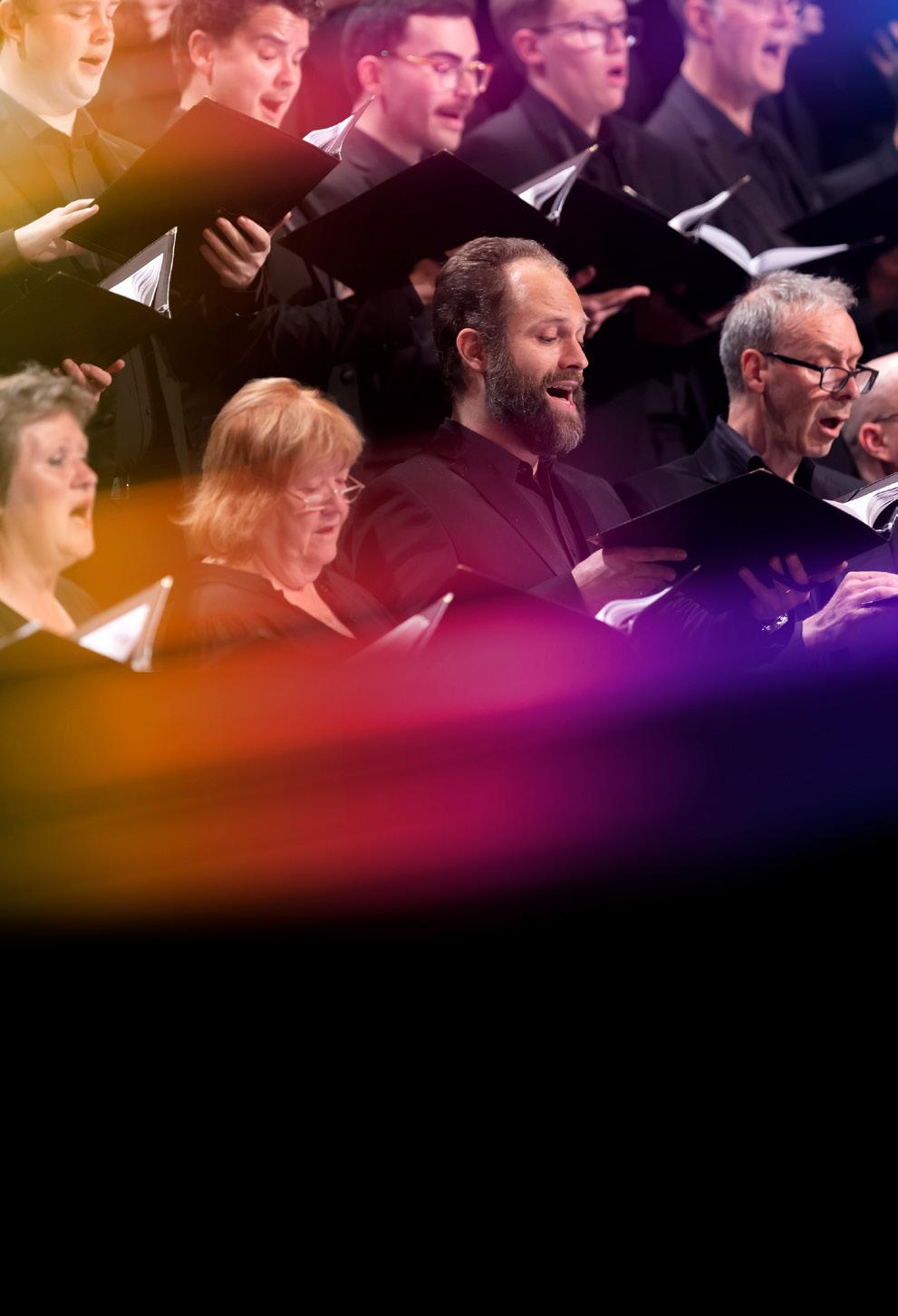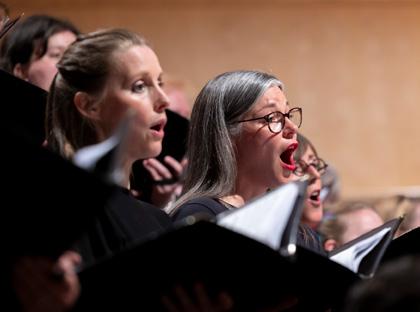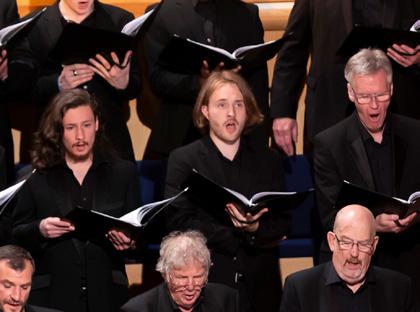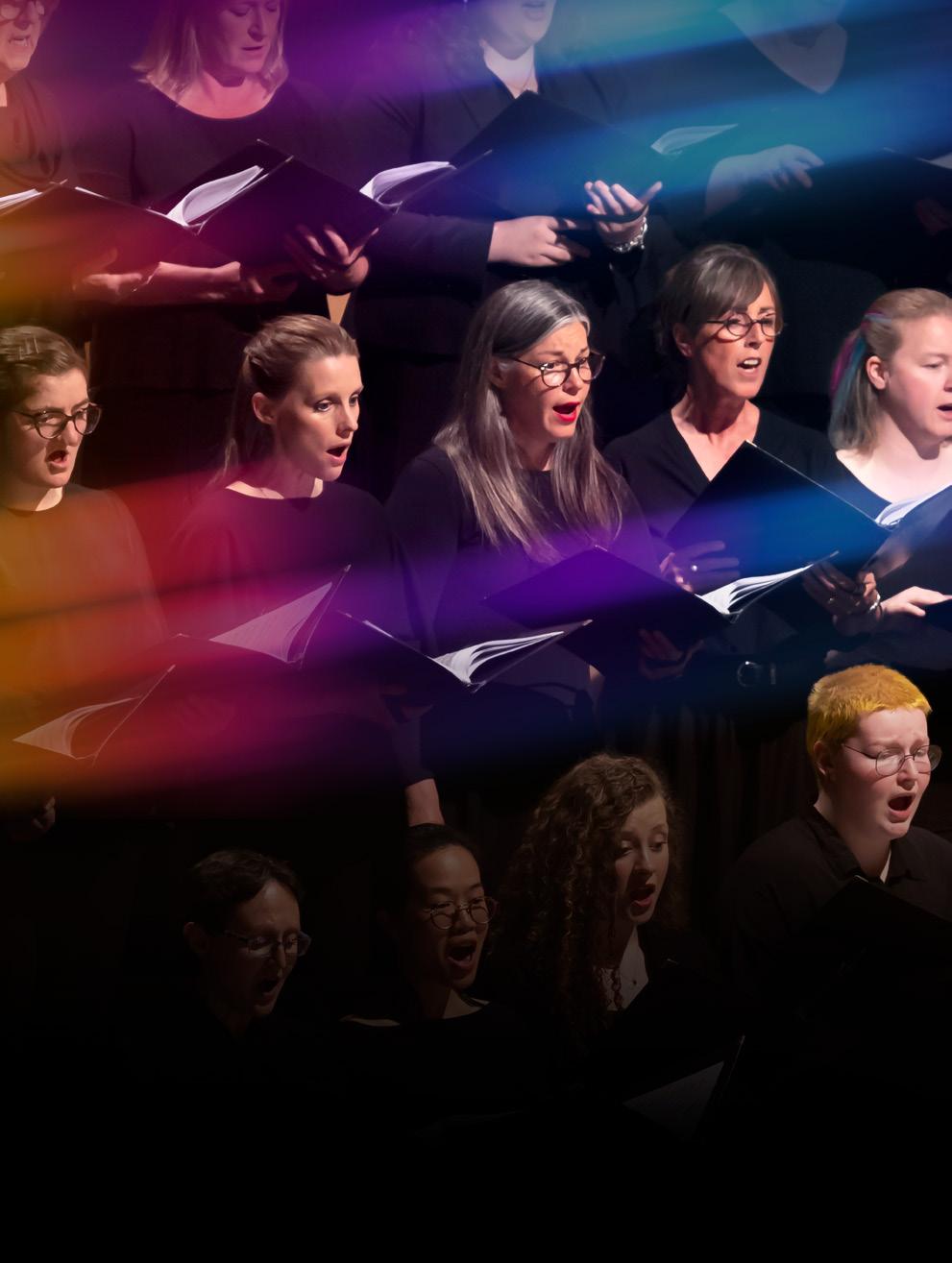

RSNO Chorus IN CONCERT
St Mary’s Cathedral, Glasgow Sat 20 Sep 2025 7.30pm

RSNO Chorus IN CONCERT
St Mary’s Cathedral, Glasgow Sat 20 Sep 2025 7.30pm
The RSNO Chorus presents a concert of wonderfully varied 20th-century choral works. Poulenc’s Gloria is full of contrasts; he said on composing it, ‘I had in mind some solemn-looking Benedictine monks that I saw playing football one day.’ Soprano Polly Beck joins the Chorus to navigate the ebbs and flows of this celebrated work. The illuminating sounds of Morten Lauridsen’s Lux Aeterna conclude the evening with the warm embrace of more than 130 voices.
POULENC Gloria [25’]
SIR JAMES MACMILLAN Divo Aloysio Sacrum [7’]
JEAN BELMONT FORD If Music Be the Food of Love [4’]
SPIRITUAL arr. ZSOLT GÁRDONYI
Singin’ wid a Sword in ma’ han’, Lord [2’]
MORTEN LAURIDSEN Lux Aeterna [27’]
The concert will be performed without an interval.
RSNO Chorus
Stephen Doughty Conductor & Director, RSNO Chorus
Polly Beck Soprano
Edward Cohen Piano
We are grateful to the Provost and Vestry of St Mary’s Episcopal Cathedral, Glasgow for the use of their beautiful building for this performance.
If viewing these notes at the concert, please do so considerately and not during performances. Please silence all mobile telephones and alerts, and refrain from taking photographs, without flash, until the end of each piece.
Francis Poulenc (1899-1963)
Gloria
FIRST PERFORMANCE
Boston, 21 January 1961
DURATION 25 minutes
Poulenc’s Gloria came about as the result of a number of false starts. In spring 1959 the Koussevitzky Foundation requested a symphony, but Poulenc brushed off the invitation by stating a symphony was ‘not my thing’. The Foundation then suggested an organ concerto; Poulenc
replied that he had already composed one. On 7 July the Foundation’s advisory board approved a $2,000 commission for a work of Poulenc’s choosing. It transpired that in the previous couple of months Poulenc had started work on his Gloria ‘in the Vivaldi style’. The work was premiered in Boston in January 1961 under Charles Münch – the composer reporting that the performance was ‘very good, very fine, a success’ – with its French premiere on 14 February the same year..
1. Gloria in excelsis Deo. Et in terra pax hominibus bonae voluntatis.
2. Laudamus te, benedicimus te. Adoramus te, glorificamus te. Gratias agimus tibi propter magnam gloriam tuam.
3. Domine Deus, Rex coelistis, Deus Pater omnipotens.
4. Domine Fili unigenite, Jesu Christe.
5. Domine Deus, Agnus Dei, Filius Patris. Qui tollis peccata mundi, miserere nobis. Qui tollis peccata mundi, suscipe deprecationem nostram.
6. Qui sedes ad dexteram Patris, miserere nobis. Quoniam tu solus Sanctus. Tu solus Dominus. Tu solus Altissimus, Jesu Christe. Cum Sancto Spiritu, in gloria Dei Patris. Amen.
Glory be to God on high, and on earth peace, good will towards men.
We praise thee, we bless thee, we worship thee, we glorify thee, we give thanks to thee for thy great glory.
O Lord God, heavenly King, God the Father Almighty.
Lord, only-begotten Son, Jesus Christ;
Lord God, Lamb of God, Son of God, that takest away the sins of the world, have mercy upon us.
Thou that takest away the sins of the world, receive our prayer.
Thou that sittest at the right hand of the Father, have mercy upon us.
For thou only art the Lord, thou art the most high, Jesus Christ, with the Holy Ghost, in the glory of the Father. Amen.
Sir James MacMillan (born 1959)
Divo Aloysio Sacrum
FIRST PERFORMANCE
Royal Scottish National Orchestra Chorus and Edinburgh Festival Ensemble, directed by Christopher Bell, St Giles’ Cathedral, Edinburgh, 27 August 1993
DURATION 7 minutes
The words Divo Aloysio Sacrum (Pray for us, St Aloysius) are inscribed above the front door of the Jesuit church of St Aloysius in Glasgow where I have attended Mass for a number of years. They are used in the middle section of this
short motet which calls for the intercession of St Aloysius, one of the most famous and beloved Jesuit saints.
The outer sections involve a simple falling major scale which receives a constantly shifting reharmonisation at each occurrence. The middle section is constructed out of a rising scale. The work is dedicated to the choir of the church and their conductor Dan Divers.
© James MacMillan
Jean Belmont Ford (born 1939)
If Music Be the Food of Love
FIRST PERFORMANCE 1988
DURATION 4 minutes
Jean Belmont Ford was born in California in 1939 and now lives in Kansas, and has written extensively for chorus. Her If Music Be the Food of Love is a richly imagined, deeply lyrical setting of a 17th-century text by Henry Heveningham, itself based on the opening lines of Shakespeare’s Twelfth Night
If music be the food of love, Sing on till I am fill’d with joy; For then my list’ning soul you move To pleasures that can never cloy. Your eyes, your mien, your tongue declare That you are music ev’rywhere.
Pleasures invade both eye and ear, So fierce the transports are, they wound, And all my senses feasted are, Tho’ yet the treat is only sound, Sure I must perish by your charms, Unless you save me in your arms.
Henry Heveningham (c.1692)
Zsolt Gárdonyi (born 1946)
Singin’ wid a sword in ma’ han’, Lord Spiritual arr.
DURATION 2 minutes
Zsolt Gárdonyi was born in Budapest, Hungary, where the RSNO Chorus will sing in just a few weeks’ time. He studied composition, organ, sacred music and theory and, in his mid-30s, was appointed Professor for Theory of Music at the Hochschule für Musik in Würzburg. In organ concerts he plays works of his father and his own, including his popular jazzy Mozart
Changes. His awards include an honorary doctorate from the Debrecen Reformed Theological University in Hungary. In 2011 he was awarded a Medal of Honour by the President of Hungary.
Singin’ wid a sword in ma’ han’, Lord, Prayin’ wid a sword in ma’ han’, Lord, Preachin’ wid a sword in ma’ han’, Lord, Hallelujah.
Morten Lauridsen (born 1943)
Lux Aeterna
FIRST PERFORMANCE
Los Angeles, 1997
DURATION 27 minutes
Each of the five connected movements in this choral cycle contains references to ‘Light’, assembled from various sacred Latin texts. I composed Lux Aeterna in response to my mother ’s final illness and found great personal comfort and solace in setting to music these timeless and wondrous words about Light, a universal symbol of illumination at all levels –spiritual, artistic and intellectual.
The work opens and closes with the beginning and ending of the Requiem Mass, with the central three movements drawn respectively from the Te Deum, O Nata Lux and Veni, Sancte Spiritus. The introduction to the Introitus softly recalls motivic fragments from two pieces
especially close to my heart (my settings of Rilke’s Contre Qui, Rose and O Magnum Mysterium), which recur throughout the work in various forms. Several new themes in the Introitus are then introduced by the chorus, including an extended canon on et lux perpetua
In Te, Domine, Speravi contains, among other musical elements, the cantus firmus ‘Herzliebster Jesu’ (from the Nuremburg Songbook, 1677) and a lengthy inverted canon on fiat misericordia. O Nata Lux and Veni, Sancte Spiritus are paired songs, the former an a cappella motet at the centre of the work and the latter a spirited, jubilant canticle. A quiet setting of the Agnus Dei precedes the final Lux Aeterna, which reprises the opening section of the Introitus and concludes with a joyful celebratory Alleluia.
© Morten Lauridsen
1. Introitus
Requiem aetemam dona eis, Domine, et lux perpetua luceat eis. Te decet hymnus Deus in Zion, et tibi reddetur votum in Jerusalem: exaudi orationem meam, ad te omnis caro veniet. Requiem aetemam dona eis, Domine, et lux perpetua luceat eis.
2. In Te, Domine, Speravi
Tu ad liberandum suscepturus hominem non horruisti Virginis uterum. Tu devicto mortis aculeo, aperuisti credentibus regna coelorum. Exortum est in tenebris lumen rectis. Miserere nostri, Domine, miserere nostri. Fiat misericordia tua, Domine, super nos quemadmodum speravimus in te.
In te Domine, speravi: non confundar in aeternum.
3. O nata lux de lumine, Jesu redemptor saeculi, dignare clemens supplicum laudes pracesque sumere.
Qui carne quondam contegi dignatus es pro perditis.
Nos membra confer effici, tui beati corporis.
4. Veni, Sancte Spiritus, Et emitte coelitus lucis tuae radium. Veni, pater pauperum, Veni, dator munerum, Veni, lumen cordium.
Consolator optime, Dulcis hospes animae, Dulce refrigerium.
In labore requies, In aestu temperies, In fletu solatium.
O lux beatissima, Reple cordis intima tuorum fidelium. Sine tuo numine nihil est in homine, Nihil est innoxium.
Rest eternal grant to them, O Lord, and let perpetual light shine upon them. A hymn befits thee, O God in Zion, and to thee a vow shall be fulfilled in Jerusalem: Hear my prayer, for unto thee all flesh shall come. Rest eternal grant to them, O Lord, and let perpetual light shine upon them.
To deliver us, you became human, and did not disdain the Virgin’s womb. Having blunted the sting of death, You opened the kingdom of heaven to all believers. A light has risen in the darkness for the upright. Have mercy upon us, O Lord, have mercy upon us. Let thy mercy be upon us, O Lord, as we have trusted in thee. In thee, O Lord, I have trusted: let me never be confounded.
O born light of light, Jesus, redeemer of the world, mercifully deem worthy and accept the praises and prayers of your supplicants.
Thou who once deigned to be clothed in flesh for the sake of the lost ones, grant us to be made members of your holy body.
Come, Holy Spirit, and send forth from heaven the ray of thy light. Come, father of the poor, come, giver of gifts, come, light of hearts.
Thou best of consolers, sweet guest of the soul, sweet refreshment.
In labour, thou art rest, in heat, the tempering, in grief, the consolation.
O light most blessed, fill the inmost heart of all thy faithful. Without your grace, there is nothing in us, nothing that is not harmful.
Lava quod est sordidum, Riga quod est aridum, Sana quod est saucium, Flecte quod est rigidum, Fove quod est frigidum, Rege quod est devium.
Da tuis fidelibus, In te confidentibus, Sacrum septenarium. Da virtutis meritum, Da salutis exitum, Da perenne gaudium.
5. Agnus Dei, qui tollis peccata mundi, dona eis requiem.
Cleanse what is sordid, moisten what is arid, heal what is hurt, flex what is rigid, fire what is frigid, correct what goes astray.
grant to thy faithful, those trusting in thee, thy sacred seven-fold gifts. Grant the reward of virtue, grant the deliverance of salvation, grant everlasting joy.
Lamb of god, who takest away the sins of the world, grant them rest.
Polly Beck
Soprano
Polly Beck is originally from Liverpool, and has lived in Greenock for over 20 years. She studied singing at the Royal Conservatoire of Scotland, achieving a BA in Music Performance. She sang for three years in the Scottish Opera chorus, then won a scholarship to the Royal Northern College of Music where she achieved an MMus. Her awards include the D’Oyly Carte, Peter Moores and Countess of Munster scholarships. She also achieved her LTCL Teacher’s Diploma in Speech and Drama.
Polly has worked with Scottish Opera Education as an animateur, and as a soloist with the Scottish Opera Orchestra delivering projects to pupils and CPD to teachers.
Polly is proud to be the Vocal Coach for the RSNO Chorus. She coaches, teaches and runs workshops for other organisations, including the RCS, National Youth Choir of Scotland, University of Glasgow, Inverclyde Music Services, the Music Partners in Education Group and NASUWT conferences on Singing, Performing and Vocal Health.
As a soloist, Polly continues to enjoy a variety of concert work both in the UK and North America. She recently sang as a soloist in Mozart’s Requiem with the RSNO Chorus, and Verdi’s Requiem with the RSNO and Chorus. This evening’s performance is her first Poulenc Gloria, which will be repeated next month with the RSNO Chorus in Budapest.
Edward Cohen
Piano
Edward Cohen brings a wealth of experience as both a concert pianist and educator, regularly collaborating with leading musicians in major venues and festivals. He is Manager of the School of Music and Lecturer at the Royal Conservatoire of Scotland, a principal study piano teacher at the University of Glasgow, and pianist for the RSNO Chorus and RSNO Youth Choruses. Additionally, he serves as Chief Executive Officer of the Scottish International Piano Competition.
As a recitalist, Edward has performed across Europe, India, Russia, the Far East and the USA. He has appeared at the BBC Proms as a soloist,
chamber musician and with mezzo-soprano Catriona Morison, and his performances have been broadcast internationally on television and radio. In concert, he has played under the batons of Ryan Bancroft, Pierre Boulez, Peter Eötvös, Neeme Järvi and Yan Pascal Tortelier, among others, with concerto performances spanning Beethoven, de Falla, Rachmaninov, Shostakovich and Strauss.
At the RSNO, Edward has worked closely with prominent conductors including Sir Andrew Davis, Tan Dun, Kristjan Järvi, Peter Oundjian and Thomas Søndergård. He has also collaborated with the Edinburgh Festival Chorus, National Youth Choir of Scotland and Scottish Chamber Orchestra Chorus, under the direction of Martyn Brabbins, Gustavo Dudamel, Richard Egarr, Sir John Eliot Gardiner, Daniel Harding and Emmanuel Krivine.
Edward undertook full-time conservatoire study with pianists Aaron Shorr, Kathryn Stott and André Watts. He began his training at London’s Royal College of Music at age ten, and is a prize-winning first-class graduate of the Royal Academy of Music. An alumnus of Indiana University and the Lucerne Festival Academy, he holds two Master of Music degrees with distinction from the RCS, where he received top awards in both solo and chamber music performance, including the prestigious Governors’ Recital Prize.
Stephen Doughty
Conductor & Director, RSNO Chorus
Stephen Doughty has been Chorus Director of the RSNO Chorus since the start of the 2022:23 Season. Since his arrival the Chorus has seen an influx of new members, and an abundance of varied and critically acclaimed performances, including Verdi’s Requiem, Britten’s War Requiem, Bruckner’s E Minor Mass and the Scottish premiere of Sir James MacMillan’s Christmas Oratorio. He has also directed the Chorus in new
and imaginative programmes in their own right, including Rheinberger’s Mass in E flat for double choir, and concerts with percussion and organ featuring Bernstein’s Chichester Psalms, the European premiere of McIntyre’s Missa Brevis and Ives’ final major choral work, Psalm 90.
Stephen’s previous 12-year tenure as Chorus Master of Belfast Philharmonic Choir included a number of world premieres, most significantly James Whitbourn’s The Seven Heavens and Philip Hammond’s Requiem for the Lost Souls of the Titanic, performed exactly 100 years since the liner went down, and further European premieres of both Stuart Scott’s Requiem Brevis, which saw the 100-strong choir separated into eight choirs spaced around the audience, and Christopher Marshall’s Earthsong
Stephen particularly enjoys working with amateur singers, not least leading regular singing days frequently involving up to 800 amateur singers. He was Musical Director of Edinburgh Bach Choir for seven years and has enjoyed directing the Garleton Singers for over 30 years, performing with them recently at the Lammermuir Festival.
Stephen plays harpsichord/organ continuo and orchestral piano and has given frequent organ recitals, including several on the grand Mulholland Organ in the Ulster Hall, Belfast. He is also in demand as an arranger and orchestrator, with a large portfolio of work particularly for young voices. He has produced a plethora of arrangements of the music of pianist Christopher Norton, including two publications of piano duets and a suite for wind sextet, and has received commissions from Children’s Classic Concerts, the Ulster Orchestra and the RSNO. Commissions from the BBC have seen his work being performed on BBC Alba and at the Last Night of the Proms, and his pieces feature on several recordings, including with the RSNO Chorus.
Stephen is an Examiner for the Associated Board of the Royal Schools of Music.
RSNO Chorus



The RSNO Chorus performs in around six different programmes in up to 20 concerts across Scotland with the Royal Scottish National Orchestra each year. The RSNO Chorus has also had great success in recording with the Orchestra. Its recordings, among others, of Prokofiev’s Alexander Nevsky, conducted by Neeme Järvi, and Holst’s The Planets, conducted by David Lloyd-Jones, have both attracted high critical acclaim.
In addition to its commitment to the Orchestra, the RSNO Chorus performs independently and has been invited to perform with orchestras in many parts of the world, establishing an international status and touring to Copenhagen, Hong Kong, Israel, Germany, Belfast, Australia, Trondheim and, most recently, Amsterdam and Prague. In 2018 it performed Britten’s War Requiem with the RSNO at the BBC Proms.
The RSNO Chorus evolved from a choir formed in 1843 to sing the first full performance of Handel’s Messiah in Scotland. Today it is one of the most successful choruses in the UK. In recent years it has performed practically every work in the standard choral repertoire along with contemporary works by renowned composers, including John Adams, Magnus Lindberg, Howard Shore and, most recently, the critically acclaimed Scottish Premiere of Sir James MacMillan’s Christmas Oratorio.
The RSNO Chorus is directed by Stephen Doughty, who was appointed to the role at the start of the 2022:23 Season.
SOPRANO 1
Alison Blair
Alison Pryce-Jones
Caroline Cradock
Catherine Taylor
Charlotte McKechnie
Iris O’Connell
Joan Lacy
Joanna Beaton
Karman Leung
Katherine Szumowski
Katie Cochrane
Mhairi Hendry
Morag Kean
Rei Camilleri
Rhona Christie
Roberta Yule
Sarah Greer
Seonaid Eadie
SOPRANO 2
Amelie Masters
Beth Kean
Carol McLean
Carole Sim Sayce
Eleanor Gaskell
Elizabeth Jack
Elspeth Waugh
Frances Kennedy
Heather Keating
Helen Hyland
Jenny Cheung
Judith Pexton
Kate Adams
Katie Dew
Laura Gorman
Leila Inglis
Lizzie Reather
Lorna Robertson
Lynsey Brook
Lynsey Scott
Mairi Therese Cleary
Margaret Mills
RSNO Chorus
Ruby Ginoris
Sally Sandground
Theresa Hoare
ALTO 1
Ailie MacDougall
Angela McDonald
Anne Browning
Anne Murphy
Anne Thies
Brenda Williamson
Cath Malone
Catriona Eadie
Esther McMillan
Fiona Taylor
Harriet Skipworth
Julia Haddow
Julia King
June Thomas
Laura MacDonald
Lauren Hadley
Linda McLauchlan
Louise Reid
Marrian Murray
Mary Taylor
Maureen McCroskie
Marita McMillan
Ruth Townsend
Sophy Ying
Steve Halfyard
Thea Jones
Uta Engelbrecht
ALTO 2
Alice Bennett
Alison Bryce
Ann Firth
Anne Newlands
Carol Leddy
Catharine Perrin
Denny Henderson
Eleanor McLaren
Elizabeth Scobie
Elizabeth Stevenson
Gillian Downie
Hilde McKenna
Jane Stansfield
Janette Morrison
Moira Allingham
Sonja Crossan
TENOR 1
Alex Rankine
Andrew Clifford
David Miller
Lawrence Smith
Nathan Dunsmore
TENOR 2
Calum Lowe
Cosma Gottardi
David MacDonald
Donald Weetman
Graham Parsonage
Kerr Noble
Laurie Nelson
Robert Paterson
Tyler Newton
BASS 1
Alistair Laird
Andrew Matheson
Fraser Dalziel
George Lloyd
Ian MacKay
Ian Mills
Keith Thomasson
Martin Engelbrecht
Martin Waddell
Peter Saunders
Robin Watson
Stephen Penman
Stuart Corkindale
Toby Reed


BASS 2
Alan Maxwell
Brian Watt
Chris Morris
Chris Spencer
Findlay Peters
Graeme Simpson
Ian Gray
John MacLellan
Kenneth Allen
Melvyn Davies
Oluwatimilehin BimboAdeola
Richard Goldie
Stephen Lipton
Stewart McMillan
Tim Reilly
RSNO CHORUS DIRECTOR
Stephen Doughty
RSNO CHORUS VOCAL COACH
Polly Beck
RSNO CHORUS REHEARSAL PIANIST
Edward Cohen


Great Mass in C minor Mozart’s
C Schumann Three Mixed Choruses
Haydn Trumpet Concerto
Mozart Great Mass in C minor K427
Thomas Søndergård Conductor
Christopher Hart Trumpet
Mojca Erdmann Soprano
Katie Coventry Mezzo-soprano
Sponsored by

Edgardo Rocha Tenor
Andreas Landin Baritone
RSNO Chorus
Stephen Doughty Director, RSNO Chorus
